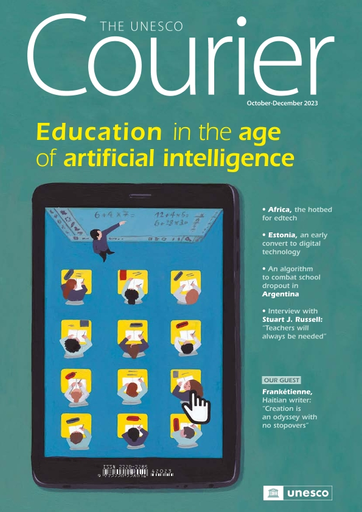العودة

The UNESCO Courier: Education in the age of Artificial Intelligence
اليونسكو
2023 - 12 - 04
“At a time when the field of education is in worldwide ferment, a single instructional phenomenon has captured the attention not only of professionals but of laymen.” Contrary to expectations, this innovative concept does not pertain to artificial intelligence (AI) or the integration of augmented reality in the classroom. Instead, the quote originates from an article in The UNESCO Courier about “teaching machines,” a collection of programmes developed in the USA to assist students in their learning.

“At a time when the field of education is in worldwide ferment, a single instructional phenomenon has captured the attention not only of professionals but of laymen.” Contrary to expectations, this innovative concept does not pertain to artificial intelligence (AI) or the integration of augmented reality in the classroom. Instead, the quote originates from an article in The UNESCO Courier about “teaching machines”, a collection of programmes developed in the USA to assist students in their learning. Remarkably, this discussion dates back to March 1965, highlighting the longstanding history of exploration and experimentation in educational technology.
This demonstrates that contemplating the role of computers in education is not a recent development. Regardless of whether they are praised or criticized, technologies are becoming an integral part of education, particularly in industrialized nations. Digital learning games, online tutorials, and massive open online courses (MOOCs) have become commonplace for an increasing number of students. The COVID-19 pandemic has further expedited this phenomenon, leading to the emergence, even in Africa, of companies specializing in digital educational services, commonly known as "Edtechs."
Despite the remarkable sophistication of modern technologies, they have not fundamentally altered the foundational principle of a teacher conducting a class for a group of students simultaneously. The potential game-changing impact of artificial intelligence (AI) comes into question with the advent of content-generating tools such as ChatGPT and intelligent tutorials. Does the introduction of these tools signal the commencement of the long-anticipated revolution in education? Regardless, the utilization of generative AI in learning introduces unprecedented challenges to existing education systems.
UNESCO’s Global Education Monitoring Report 2023 underscores the invaluable potential of these new tools in offering personalized support for students, especially those with disabilities or residing in remote areas. However, the use of generative AI also gives rise to concerns regarding the digital divide, data confidentiality, and the dominance of major global corporations in this sector. At present, safeguards to address these concerns are notably absent.
Therefore, there is an imminent need for the establishment of regulations to guarantee that the utilization of AI in education is centered around human interests and serves the best interests of learners. In alignment with this imperative, UNESCO released in September 2023 the first-ever Guidance for generative AI in education and research, developed to address the disruptions caused by these technologies. It complements other resources produced by the organization, namely the Recommendation on the Ethics of Artificial Intelligence and a guidance for policy-makers on AI and education, both published in 2021.
For more information:
https://unesdoc.unesco.org/ark:/48223/pf0000387029_eng
أحدث المنشورات
القائمة الكاملةاليونسكو
المستقبل على المحك: لماذا الاستثمار في التعليم أمر بالغ الأهمية؟
يسلط هذا التقرير، الذي أعدّته اللجنة التوجيهية الرفيعة المستوى المعنية بالهدف الرابع من أهداف التنمية المستدامة (SDG4) بالتعاون مع الشراكة العالمية من أجل التعليم (GPE) ونُشر في عام 2024، الضوء على الحاجة المُلِحّة لتعزيز الاستثمار في التعليم كوسيلة أساسية لمواجهة التحديات العالمية، بما في ذلك تغيّر المناخ، والتطورات التكنولوجية، والتحوّلات الديموغرافية.
اليونسكو
المدن العربية تتألق في جوائز مدن التعلم لليونسكو لعام 2024
تُحرز المدن العربية تقدمًا كبيرًا في مجال التنمية المستدامة والتعلم مدى الحياة، مع تركيز متزايد على إنشاء بيئات تعليمية شاملة تُسهم في تحقيق الأهداف التنموية المحلية والعالمية. وقد احتفلت جوائز مدن التعلم لعام 2024، التي تُمنح من قِبَل اليونسكو، بهذه الجهود، مبرزةً المدن العربية التي تميزت في بناء مجتمعات تعليمية.
اليونسكو
مؤتمر اليونسكو العالمي الثالث للموارد التعليمية المفتوحة: تعزيز الوصول الشامل إلى المعرفة
انطلق مؤتمر اليونسكو العالمي الثالث للموارد التعليمية المفتوحة (OER) في 19 نوفمبر/تشرين الثاني 2024، في مركز دبي التجاري العالمي في دولة الإمارات العربية المتحدة، ليكون المرة الأولى التي يُستضاف فيها هذا الحدث في العالم العربي. نظّم مؤتمر اليونسكو بالتعاون مع مؤسسة محمد بن راشد آل مكتوم للمعرفة (MBRF)واستقطب أكثر من 500 مشارك ومشاركة من نخبة القادة العالميين، وصنّاع السياسات، وممثلي المؤسسات التعليمية، بما في ذلك وزراء، وأكاديميون، وخبراء من القطاع الخاص. وتركّزت المناقشات على مدار يومين حول تعزيز الاستفادة من الموارد التعليمية المفتوحة والتقنيات الناشئة، بهدف تحقيق وصول عادل وشامل إلى التعليم، وتقليص الفجوة الرقمية على الصعيد العالمي.
اليونسكو
الأمم المتحدة تحتفي في شهر ديسمبر/كانون الأول بحقوق الإنسان، والأشخاص ذوي الإعاقة، واللغة العربية
تُحيي الأمم المتحدة في شهر ديسمبر/كانون الأول ثلاث مناسبات بارزة تُعنى بحقوق الإنسان، وبحقوق الأشخاص ذوي الإعاقة، وباللغة العربيّة، ممّا يجعل هذا الشهر فرصةً عالميّةً للتفكير والعمل. وتقود اليونسكو الجهود لتعزيز التعليم الشامل، وحماية حقوق الإنسان، والاحتفاء بالإرث الثقافيّ واللغويّ للّغة العربيّة، من خلال سلسلة من الفعاليات والمبادرات.